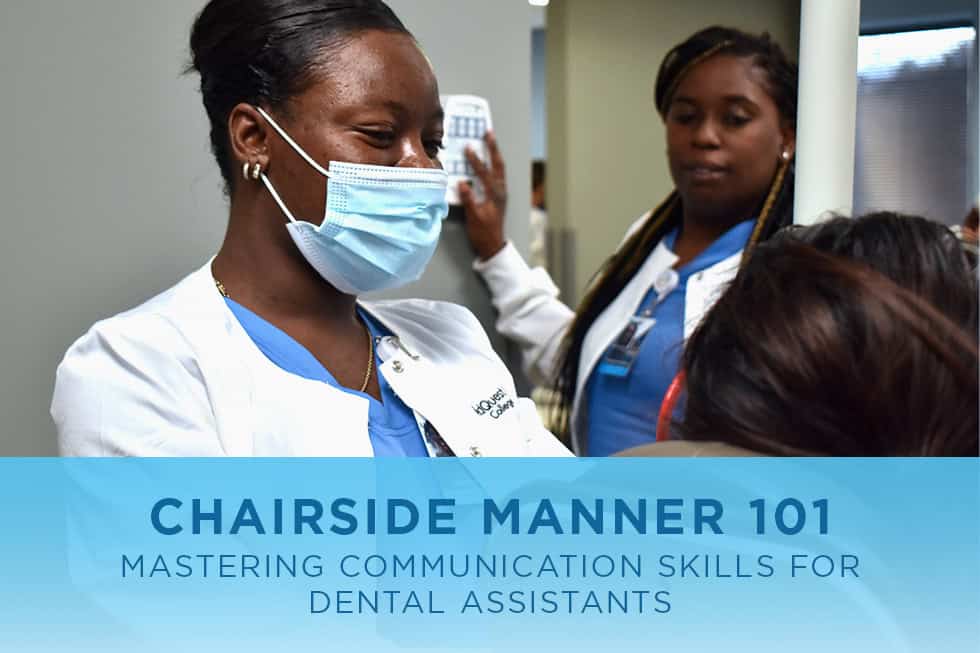In dental care, technical expertise is essential, but equally crucial is the ability to connect with patients on a personal level. Chairside manner, the way dental professionals interact with patients during appointments, plays a significant role in patient satisfaction and overall experience. In this blog, we’ll delve into Chairside Manner 101, focusing on mastering communication skills for dental assistants.
Understanding Chairside Manner
Chairside manner refers to dental professionals’ demeanor, attitude, and communication style when interacting with patients. It encompasses everything from greeting patients warmly to explaining procedures clearly and empathetically. Mastering chairside manners is essential for building trust, alleviating anxiety, and ensuring patients feel comfortable throughout their dental visits.
Key Elements of Effective Communication
- Active Listening: Dental assistants must listen attentively to patients’ concerns, questions, and preferences. By actively listening, assistants can address patient needs more effectively and build rapport.
- Empathy and Compassion: Showing empathy towards patients’ feelings and experiences can go a long way in easing anxiety and building trust. Dental assistants should demonstrate genuine care and compassion towards patients, acknowledging their emotions and concerns.
- Clear Communication: Effective communication involves conveying information clearly, concisely, and clearly. Dental assistants should avoid using jargon and medical terminology that patients may find confusing. Instead, they should explain procedures, treatment options, and aftercare instructions in plain language.
- Nonverbal Cues: Nonverbal communication, such as body language and facial expressions, also plays a significant role in chairside manners. Dental assistants should maintain open and welcoming body language, make eye contact, and smile warmly to convey friendliness and approachability.
Building Patient Rapport
- Establishing Trust: Trust is the foundation of a positive patient-provider relationship. Dental assistants can build trust by demonstrating competence, professionalism, and sincerity in their interactions with patients.
- Creating a Comfortable Environment: Creating a welcoming and comfortable environment can help put patients at ease during their dental visit. Dental assistants can offer amenities such as blankets, pillows, and soothing music to enhance patient comfort.
- Addressing Patient Concerns: Patients may have fears or anxieties about dental procedures. Dental assistants should actively listen to patient concerns and provide reassurance and support to alleviate anxiety and build confidence.
Benefits of Effective Chairside Manner
- Enhanced Patient Satisfaction: Patients are more likely to be satisfied with their dental experience when they feel heard, respected, and cared for by dental assistants.
- Improved Treatment Outcomes: Effective communication and rapport-building can lead to better treatment outcomes as patients are more likely to comply with treatment plans and follow aftercare instructions.
- Positive Practice Reputation: Practices with dental assistants who excel in chairside manner are likely to receive positive reviews and referrals from satisfied patients, enhancing the practice’s reputation and attracting new patients.
Mastering communication skills and developing an effective chairside manner are essential for dental assistants to provide exceptional patient care. By listening attentively, demonstrating empathy, and building rapport with patients, dental assistants can enhance patient satisfaction, improve treatment outcomes, and contribute to the overall success of the dental practice. If you’re interested in pursuing a career as a dental assistant, consider enrolling in the programs offered at Medquest College. Click here to explore your options and take the first step toward a career in dental healthcare.

